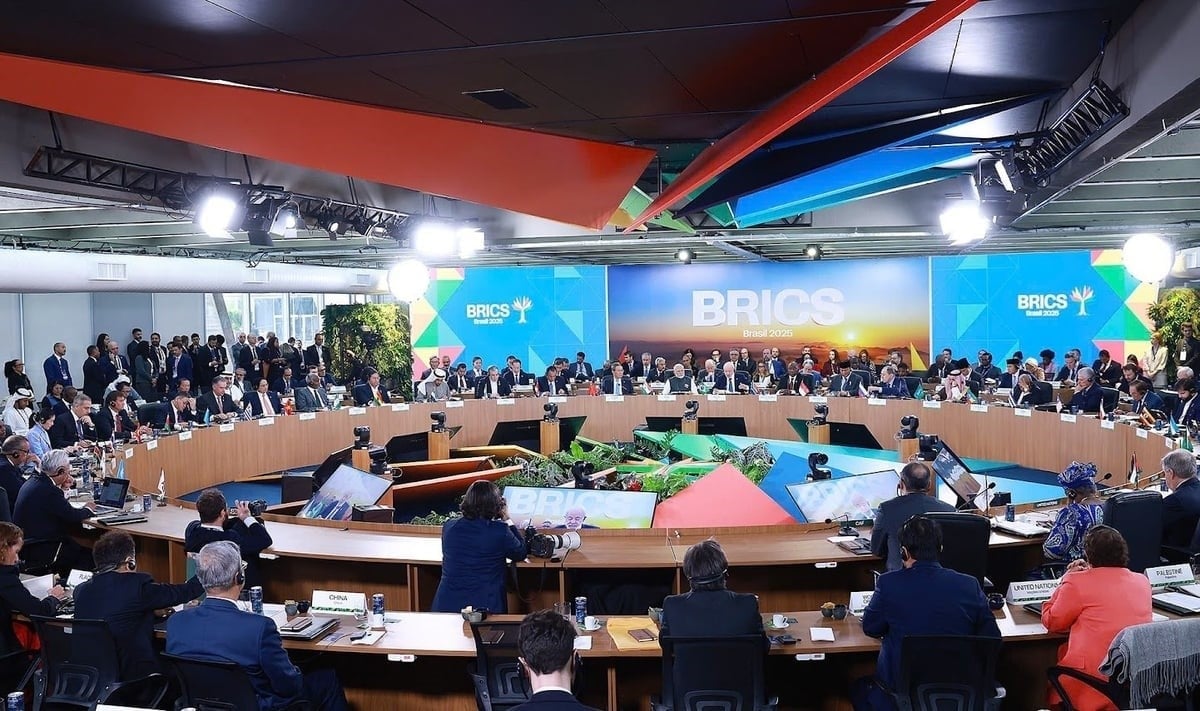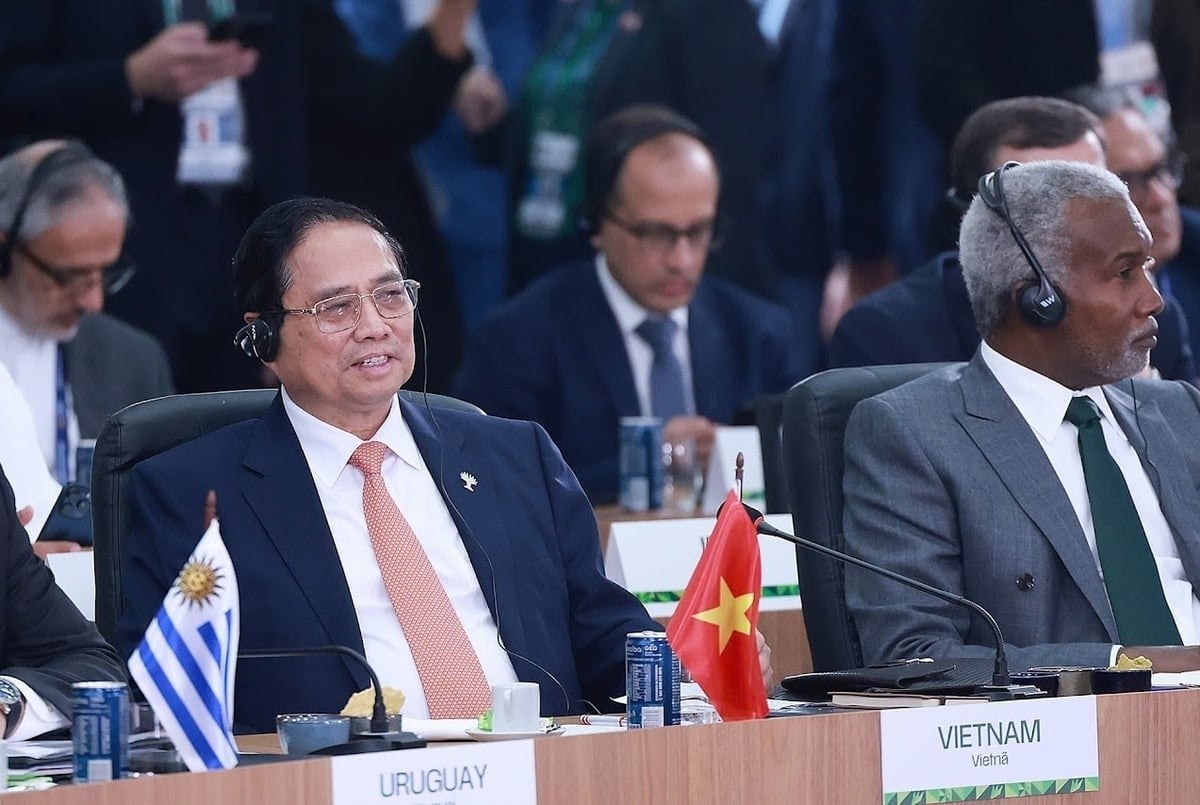November 5, 2025 | 07:33 GMT +7
November 5, 2025 | 07:33 GMT +7
Hotline: 0913.378.918
November 5, 2025 | 07:33 GMT +7
Hotline: 0913.378.918
In his opening remarks, the Brazilian president emphasized the urgent need for a just and well-planned energy transition, reducing reliance on fossil fuels and moving toward the goal of being "deforestation-free." He called for strong investments to protect tropical forests and underscored the importance of climate justice in addressing poverty and social inequality.
Leaders warned of the risks of delays, even reversals, in the progress toward achieving the United Nations' Sustainable Development Goals (SDGs). They called for global cooperation to cope with the climate crisis, strengthen global health governance, and promote sustainable development. A range of solutions was shared to narrow inequalities, enhance public health capacity, improve social welfare, and protect the ecological environment.

The plenary session on "Environment, COP30, and Global Health." Photo: VGP.
In his important speech at the session, Prime Minister Pham Minh Chinh expressed strong support for and appreciation of the host country Brazil's decision to prioritize environmental protection and global health, which are issues of vital importance to the planet, at this year’s expanded BRICS Summit.
The Prime Minister (PM) emphasized that the world's experiences in the aftermath of the COVID-19 pandemic, in responding to natural disasters, epidemics, climate change, resource depletion, and population aging, have demonstrated that the international community is not truly ready. Multilateral institutions remain insufficiently cohesive and lack strong cooperation to overcome crises. Therefore, the PM stressed the need to change mindsets, renew awareness, and act urgently with the spirit of "shared journey, shared action, shared benefits, and shared success."
Prime Minister Pham Minh Chinh outlined five important proposals.
First, promote the formation of a common global, people-centered, and comprehensive awareness and approach to environmental protection and public health.
Second, ensure the principle of common but differentiated responsibilities, fairness, and justice in addressing environmental and health challenges. This must be aligned with the historical context, development level, and resources of each country. At the same time, call on developed countries to take responsibility in fulfilling their commitments on finance, technology transfer, and human resource training support.
Third, make efforts to mobilize adequate and sustainable resources to realize climate and health goals. The Prime Minister affirmed Vietnam’s support for Brazil's priorities for COP30 while stressing the need to achieve breakthroughs in green and innovative financial mechanisms with stronger private sector involvement.
Fourth, maximize the role of science, technology, innovation, and digital transformation in protecting the environment and developing healthcare. Countries should strengthen cooperation in the development of green technologies, digital infrastructure, and knowledge sharing, thereby narrowing the development gap among nations.
Fifth, promote substantive and effective reform of global governance institutions in the areas of environment, climate, and health. It is also necessary to uphold the central role of the United Nations and multilateral cooperation and enhance substantive and effective engagement of regional and interregional cooperation mechanisms to ensure that global commitments on climate and health are implemented fairly, transparently, and efficiently.

The PM attends and delivers remarks at the plenary session on "Environment, COP30, and Global Health." Photo: VGP.
Prime Minister Pham Minh Chinh emphasized that environmental protection, climate change response, and disease control are the foundations of all national development policies. These are not only natural choices or objective requirements but also the demands of the era. The PM affirmed Vietnam’s strong determination and efforts to achieve the goal of carbon neutrality by 2050 while actively and responsibly contributing to global cooperation mechanisms on environment, climate, and health.
Prime Minister Pham Minh Chinh shared a message: "There is no substitute for Earth, no asset more valuable than health, and no foundation more solid than humanity. Only through collective action can we leave future generations a thriving planet, a prosperous world, and a happy humankind."
The session concluded the expanded BRICS Summit 2025, marking many imprints of the host country, Brazil. The Summit reflected the shared concern of developing countries in promoting multilateral cooperation, strengthening international solidarity, and building inclusive, sustainable, and people-centered global governance.
Vietnam demonstrated its role and responsibility, actively contributing to the overall success of the Summit, thereby highlighting the image of a dynamic nation, firmly committed to economic development associated with environmental protection and proactive global integration for peace, cooperation, and development in the region and the world.
Translated by Thu Huyen

(VAN) Quang Ngai is promoting the application of digital technology to expand markets for OCOP products and enhance product quality.

(VAN) The collaboration between Viet Nam and Ireland in food system transformation goes beyond capital or technology; it is a process of co-creating knowledge, starting at the policy level.

(VAN) Action plans are leaving the conference table and reaching the fields, where provinces like Dong Thap, Son La, and Nghe An are piloting models that integrate production with livelihoods and the environment.

(VAN) A new, collaborative management approach is being piloted, replacing separate silos with coordinated action across multiple sectors to build a transparent, sustainable, and accountable system.

(VAN) The Food System Transformation (FST) is expanding into the livestock sector, where biotechnology is emerging as a new direction to reduce antibiotics, enhance quality, and improve food safety.
/2025/11/04/2722-1-131831_602.jpg)
(VAN) The 23rd Asia Water Council (AWC) Summit and AWC 2025 Technical Workshop will take place from November 5-6 in Hanoi.
/2025/11/04/0215-2-235411_38.jpg)
(VAN) The International Conference of the 100% Alliance affirmed the commitment to regional cooperation toward achieving 100% sustainable management of ocean spaces, with Viet Nam's participation.